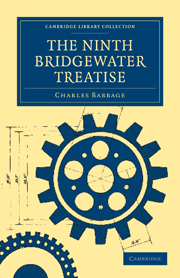Book contents
- Frontmatter
- Contents
- Preface
- Title in the Series
- CHAPTER I Nature of the Argument
- CHAPTER II Argument in favour of Design from the changing of Laws in Natural Events
- CHAPTER III Argument to show that the Doctrines in the preceding Chapter do not lead to Fatalism
- CHAPTER IV On the Account of the Creation, in the First Chapter of Genesis
- CHAPTER V Further View of the same Subject
- CHAPTER VI Of the Desire of Immortality
- CHAPTER VII On Time
- CHAPTER VIII Argument from Laws intermitting—on the Nature of Miracles
- CHAPTER IX On the permanent Impression of our Words and Actions on the Globe we inhabit
- CHAPTER X On Hume's Argument against Miracles
- CHAPTER XI À priori Argument in favour of the Occurrence of Miracles
- CHAPTER XII Thoughts on the Nature of Future Punishments
- CHAPTER XIII Reflections on Free Will
- CHAPTER XIV Thoughts on the Origin of Evil
- CONCLUSION
- APPENDIX
- CORRECTIONS
CHAPTER XII - Thoughts on the Nature of Future Punishments
Published online by Cambridge University Press: 05 October 2010
- Frontmatter
- Contents
- Preface
- Title in the Series
- CHAPTER I Nature of the Argument
- CHAPTER II Argument in favour of Design from the changing of Laws in Natural Events
- CHAPTER III Argument to show that the Doctrines in the preceding Chapter do not lead to Fatalism
- CHAPTER IV On the Account of the Creation, in the First Chapter of Genesis
- CHAPTER V Further View of the same Subject
- CHAPTER VI Of the Desire of Immortality
- CHAPTER VII On Time
- CHAPTER VIII Argument from Laws intermitting—on the Nature of Miracles
- CHAPTER IX On the permanent Impression of our Words and Actions on the Globe we inhabit
- CHAPTER X On Hume's Argument against Miracles
- CHAPTER XI À priori Argument in favour of the Occurrence of Miracles
- CHAPTER XII Thoughts on the Nature of Future Punishments
- CHAPTER XIII Reflections on Free Will
- CHAPTER XIV Thoughts on the Origin of Evil
- CONCLUSION
- APPENDIX
- CORRECTIONS
Summary
Who has not felt the painful memory of departed folly? who has not at times found crowding on his recollection, thoughts, feelings, scenes, by all perhaps but him forgotten, which force themselves involuntarily on his attention? Who has not reproached himself with the bitterest regret at the follies he has thought, or said, or acted? Time brings no alleviation to these periods of morbid memory: the weaknesses of our youthful days, as well as those of later life, come equally unbidden and unarranged, to mock our attention and claim their condemnation from our severer judgment.
It is remarkable that those whom the world least accuses, accuse themselves the most; and that a foolish speech, which at the time of its utterance was unobserved as such by all who heard it, shall yet remain fixed in the memory of him who pronounced it, with a tenacity which he vainly seeks to communicate to more agreeable subjects of reflection. It is also remarkable that whilst our own foibles, or our imagined exposure of them to others, furnish the most frequent subject of almost nightly regret, yet we rarely recall to recollection our acts of consideration for the feelings of others, or those of kindness and benevolence. These are not the familiar friends of our memory, ready at all times to enter the domicile of mind its unbidden but welcome guests.
- Type
- Chapter
- Information
- The Ninth Bridgewater Treatise , pp. 143 - 150Publisher: Cambridge University PressPrint publication year: 2009First published in: 1837



